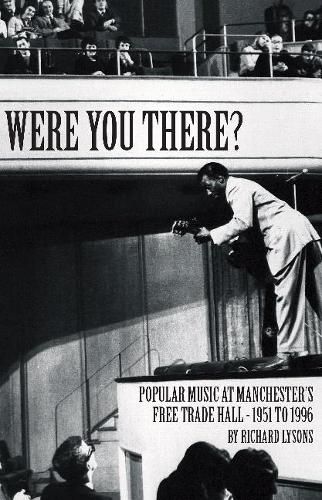Readings Newsletter
Become a Readings Member to make your shopping experience even easier.
Sign in or sign up for free!
You’re not far away from qualifying for FREE standard shipping within Australia
You’ve qualified for FREE standard shipping within Australia
The cart is loading…






Manchester’s Free Trade Hall was arguably the most important popular music venue in Great Britain between 1951 and 1996. After several incarnations, the building was re-constructed in the wake of the Manchester Blitz and opened in 1951 as the new home of the city’s esteemed Halle Orchestra. Yet it was popular music which would secure the venue its fame as it responded to each wave of popular music from jazz and skiffle, through rock ‘n’ roll and folk to prog, punk and heavy metal. From Billie Holiday to Blondie, Duke Ellington to Led Zeppelin, Pink Floyd to Happy Mondays, Rolling Stones to The Beach Boys, David Bowie to Suede, just about everyone who mattered played there. The Free Trade Hall was also the venue for incendiary gigs by Bob Dylan in 1966 and the Sex Pistols a decade later which changed the course of music history. Richard Lysons’ meticulously researched tome will be of interest to anyone who ever attended a concert at the venue or has an interest in the history of popular music in Britain’s most musically important city. Alongside his own expert commentary on every headline act he gives the reader a sense of what was going on at other venues in Manchester. There are photographs of several seminal blues gigs by Brian Smith who attended concerts at the Free Trade Hall throughout the 1960s.
$9.00 standard shipping within Australia
FREE standard shipping within Australia for orders over $100.00
Express & International shipping calculated at checkout
Manchester’s Free Trade Hall was arguably the most important popular music venue in Great Britain between 1951 and 1996. After several incarnations, the building was re-constructed in the wake of the Manchester Blitz and opened in 1951 as the new home of the city’s esteemed Halle Orchestra. Yet it was popular music which would secure the venue its fame as it responded to each wave of popular music from jazz and skiffle, through rock ‘n’ roll and folk to prog, punk and heavy metal. From Billie Holiday to Blondie, Duke Ellington to Led Zeppelin, Pink Floyd to Happy Mondays, Rolling Stones to The Beach Boys, David Bowie to Suede, just about everyone who mattered played there. The Free Trade Hall was also the venue for incendiary gigs by Bob Dylan in 1966 and the Sex Pistols a decade later which changed the course of music history. Richard Lysons’ meticulously researched tome will be of interest to anyone who ever attended a concert at the venue or has an interest in the history of popular music in Britain’s most musically important city. Alongside his own expert commentary on every headline act he gives the reader a sense of what was going on at other venues in Manchester. There are photographs of several seminal blues gigs by Brian Smith who attended concerts at the Free Trade Hall throughout the 1960s.